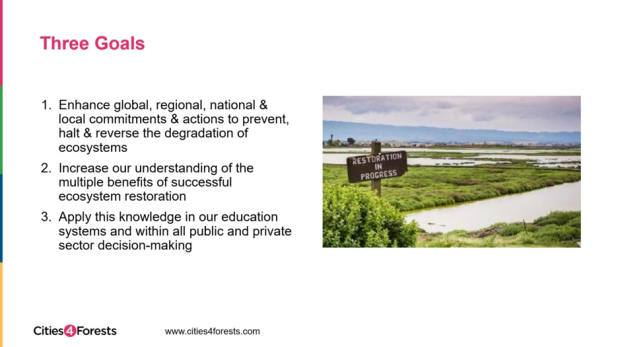EXPERT PANEL on Cities4Forests Day: What is ecosystem restoration all about?
Discussion details
Ten million hectares of forest are being lost per year, according to the latest UNEP data. This deforestation has a direct impact on the health and economic stability of population centers. To highlight the need for symbiosis between urban areas and woodlands, Cities4Forests Day was held on 18 March to feed ecosystem restoration discussions surrounding the UN International Day of Forests (21 March) and generate momentum for the UN Decade on Ecosystem Restoration (2021-2030), which will be formally launched on World Environment Day (5 June). Established by Pilot Projects, REVOLVE, and the World Resources Institute, Cities4Forests is a partner of the UN Decade that works to strengthen the relationship between urban and forest systems by raising awareness and working on the ground.
Experts from the United Nations Environment Programme (UNEP), the International Union for Conservation of Nature (IUCN), and Ecosystem Restoration Camps (ERC) met at the day’s panel event, moderated by Stuart Reigeluth, Founder of the REVOLVE Group and a co-founder of Cities4Forests, to discuss the nature of this relationship, the ongoing efforts to restore forest ecosystems, and the development of ecosystem restoration as a concept and practice. The speakers outlined methods, practices, and frameworks by which organisations and individuals can seize the opportunities and tackle the challenges of harmonizing city and forest life in the crucial period for planetary health that the UN Decade demarcates.
Tim Christophersen, Head of the Nature for Climate Branch in UNEP’s Ecosystems Division, presented the Decade’s goals. On the relationship of cities and forests, he underscored the importance of forest watersheds, which serve as the main source of clean water for one third of all large population centers. Forests also protect human health by filtering air pollution and nurturing healthy plants and animals, he noted.

He stressed the need to educate ourselves about ecology, highlighting the fundamental role ecology plays in a healthy economy. Whereas “ecology is the knowledge of our household; economy is the management of our household,” he observed, speaking of their shared etymological root in Greek, oikos.
“Without knowledge, you can’t manage.”
“Somewhere along the line, ecology and economy got separated, and now the economy is tanking because of ecology,” he said. “If we want to set the boat right, we first of all need some more ecological literacy in the world.”
Ecological literacy and the actions that it informs are fundamental to reaching the UN Sustainable Development Goals (SDGs) for healthy economies. The economic SDGs are dependent on meeting the societal ones, which in turn rely on meeting the nature-focused goals, he said.

He called on urban residents to demand necessary policies and expressed optimism that the political will for climate action and biodiversity restoration is nearing a “tipping point”. “By improving and increasing the connectivity amongst the organisations on this call and dozens—and hopefully at some point, hundreds—of others, we provide the basis for an increased political will out of an increased political attention to a topic that is fed by a global movement.”
Marcos Valderrabano, IUCN Programme Manager of the Red List of Ecosystems, spoke about how ecosystems change and degrade and highlighted emerging frameworks for assessing the risk of ecosystem collapse that IUCN’s Red List of Ecosystems Programme is developing. This framework is enabled by the IUCN Global Ecosystem Typology 2.0, published in December 2020.

Ashleigh Brown spoke about her work as a Camp Coordinator and Co-founder of Ecosystem Restoration Camps, which offers a “model for large-scale, bottom-up, grass-roots ecosystem restoration and rehabilitation around the world”. The organisation is working to restore 2,721 hectares through partnerships with thirty-seven camps, including startups. They aim to reach one hundred camps by 2030.

The grassroots, political, and methodological initiatives raised in the discussion offer points of reference for fostering a mutually reinforcing relationship between cities and forests across the UN Decade. All interested organizations and individuals are called upon to participate and organize events around the Decade’s launch on World Environment Day. The run-up to the UN Forum on Forests (26-30 April) also provides an opportunity for influencing high-level policymaking on the restoration, preservation, and use of forests, in advance of the launch.

Watch the event recording here.
Visit:
- UNEP’s website to explore its work on forests.
- The World Environment Day website for more about the launch of the UN Decade on Ecosystem Restoration and how you can join the #GenerationRestoration movement.
Log in with your EU Login account to post or comment on the platform.